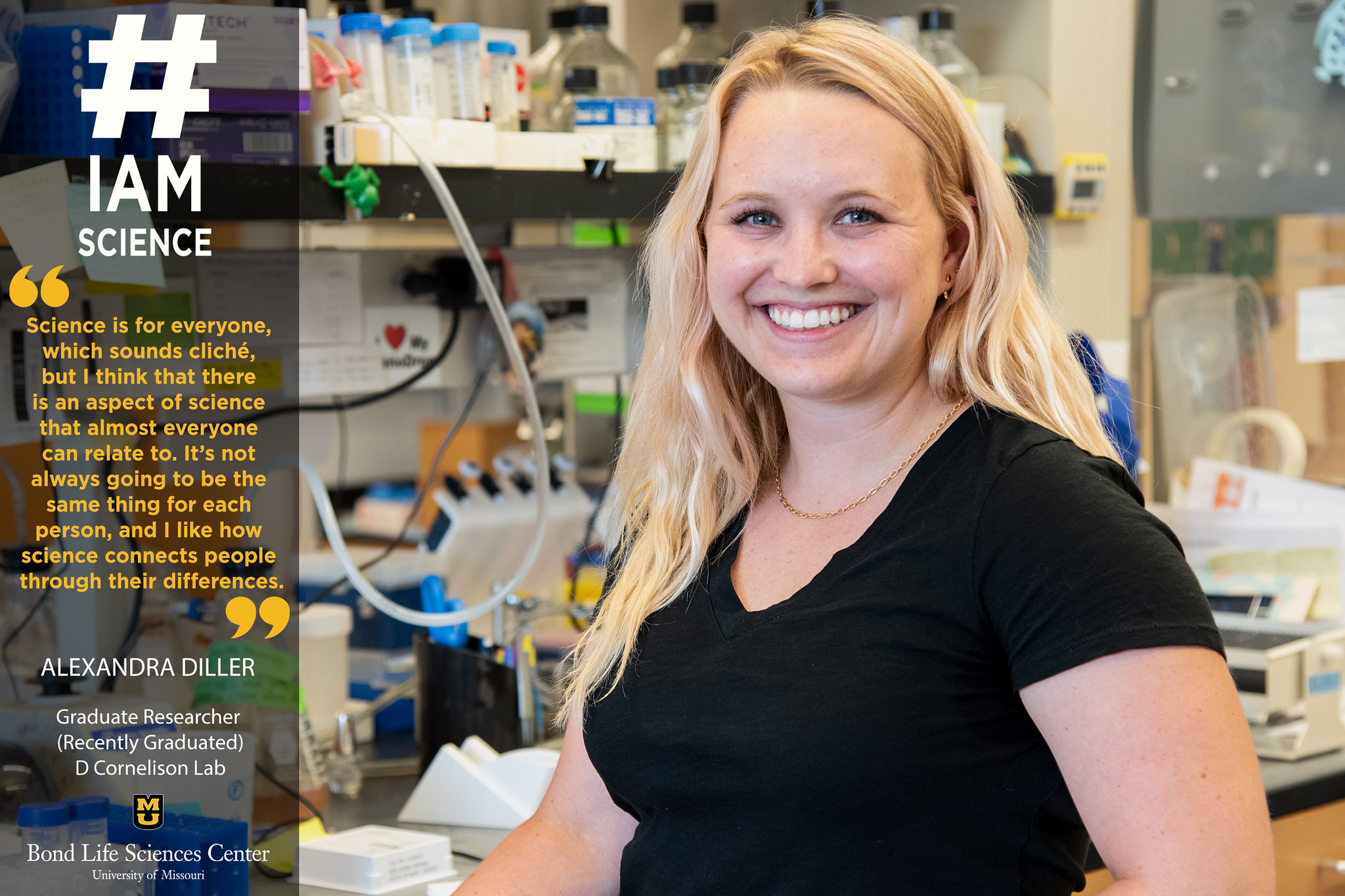Published on
Alexandra Diller jumped off a cliff, in a sense.
Instead of taking on more clear and straightforward science, she dove into vessel regeneration and never looked back as she works on the burning question, ‘can muscles regenerate in the absence of blood vessels and vice versa?’
“Knowing how vessels grow back can one day improve treatment options and help someone who has suffered a traumatic muscle injury and I really like contributing to that, but at the same time I want to know and do more right now” said the D Cornelison lab member.
Diller studies the interaction between regenerating muscle and blood vessels after a traumatic muscle injury and the role of ephrin-B2 (an essential protein for blood vessel formation during development) in blood vessel regeneration and when it is no longer necessary for development. While she studies these questions, she sees the connections in friends, colleagues and hobbies.
“One of my best friends works in the NICU [Neonatal Intensive Care Unit] as a social worker, and it can be hard for us to find common ground in terms of our careers,” Diller said, “but I started working on development and she was like ‘oh we see that in the babies too’ and then all of a sudden we had this crazy crossover between social work and mouse development.”
Recognizing these similarities lets Diller find new research skills and learn from others outside the field.
“It’s crazy how I can talk to an ecologist friend of mine who’s studying something completely different from me, and then they have an idea or say ‘have you tried this,’” she said. “Sometimes that leads to inspiration to help deal with a setback.”
Balance outside work helps with setbacks and obstacles within her research project. Diller tends to spend her free time on activities that prioritize her health, her relationships with her husband and friends, and her dog, Harry. She takes her dog to agility classes, but finds Harry is more in tune with the program than she is.
“I’m constantly being corrected by the trainers because you’re not supposed to step in front of your dog, and Harry just stands there and looks at me like ‘How do you not get this mom?’ But it’s a fun activity for us to do together, so I continue doing it,” Diller said. HIIT and resistance training classes bring more balance and a chance to interact with those outside the research field.
While Diller’s hobbies come in waves, her love for research persists as she expands her work in the realm of muscle regeneration.
Currently, the Cornelison lab is using conditional knockouts—a technique used to eliminate or delete specific genes from the mouse’s DNA—and pharmacological methods to inhibit angiogenesis – the process through which new blood vessels form—to study the impact impaired blood vessel regeneration has on muscle regeneration. The team looks at hints within the vessels and vessel network, such as new growth (i.e., tip cells), vessel dilation, vessel branching, as well as other structural deformities such as anastomoses (i.e., a connection between blood vessels). But Diller is always striving for more with her work.
Resilience is key when often each new discovery raises more questions about how vessels regenerate.
“As a grad student it’s really important to have coping mechanisms for the level of stress that you go through,” Diller said. “When something fails, being able to take a step back and stop thinking about it helps a lot. And once you’ve calmed down, the best way to deal with it is by talking to the people around you.”
Diller recently graduated from the University of Missouri and has accepted an NIH fellowship at the University of Florida to study the effect of hyperbaric oxygen treatment on vessel regeneration in the diaphragm in a spinal cord injury model. Diller is excited to work specifically on diaphragm recovery options and take this patient-focused opportunity.
“Science is for everyone, which sounds cliché, but I think that there is an aspect of science that almost everyone can relate to. It’s not always going to be the same thing for each person, and I like how science connects people through their differences.”
